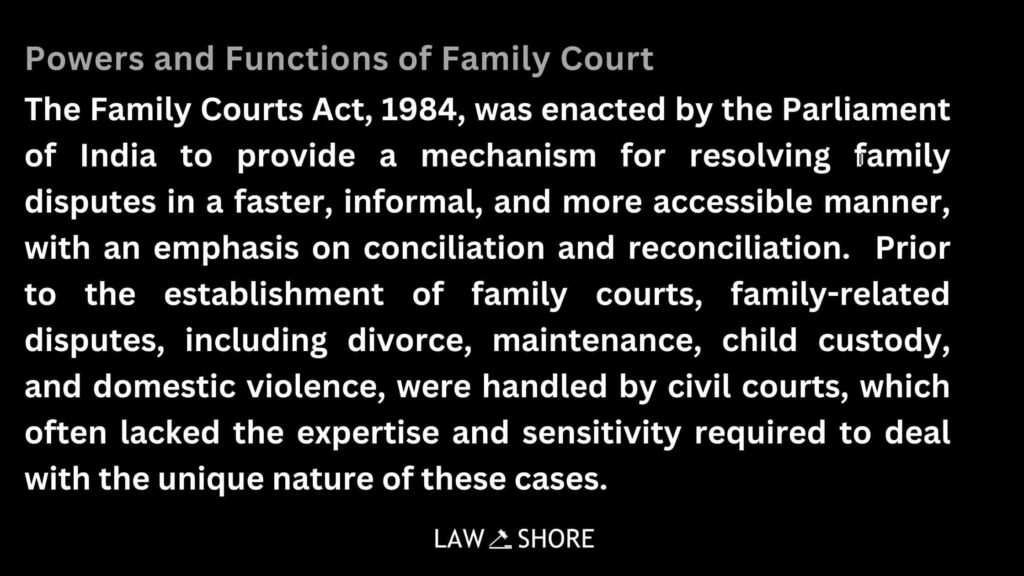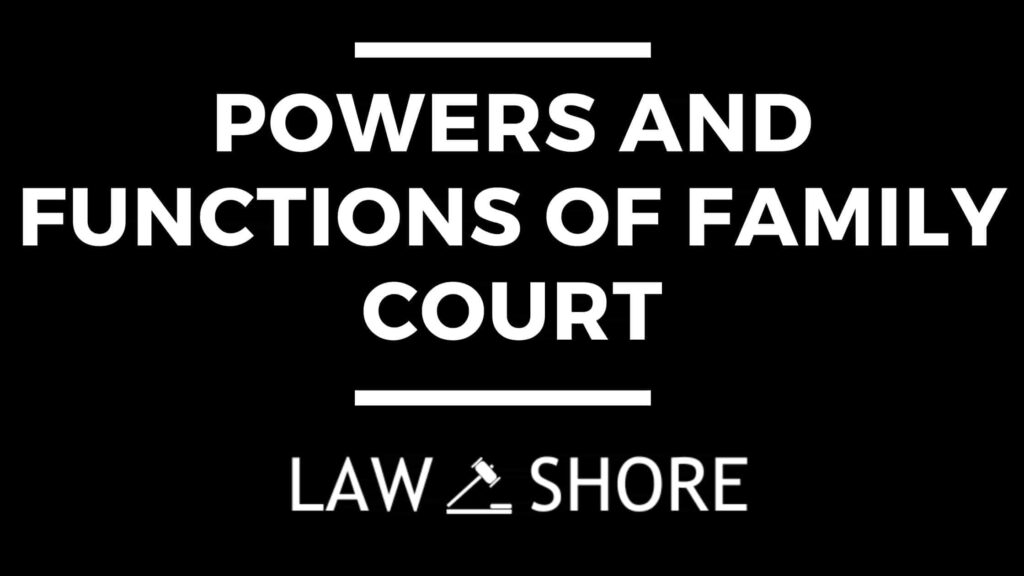Powers and Functions of Family Court in India
Table of Contents
ToggleIntroduction
The Family Courts Act, 1984, was enacted by the Parliament of India to provide a mechanism for resolving family disputes in a faster, informal, and more accessible manner, with an emphasis on conciliation and reconciliation. In this article we will explore the Powers and Functions of Family Court.
Prior to the establishment of family courts, family-related disputes, including divorce, maintenance, child custody, and domestic violence, were handled by civil courts, which often lacked the expertise and sensitivity required to deal with the unique nature of these cases. The Family Courts Act was conceived to address these issues, streamline the judicial process, and reduce the emotional and psychological burden on the parties involved.

Aim and Objective of the Family Courts Act, 1984
The primary aim of the Family Courts Act, 1984, was to provide a legal framework for the speedy and effective resolution of disputes arising out of family matters. The objectives outlined in the Act can be summarized as follows:
- Expeditious Disposal of Family Disputes: The Act was introduced to reduce the time and delays associated with the disposal of family-related cases. Family courts are designed to provide quicker justice compared to regular courts.
- Less Formal Proceedings: The Act seeks to make the process of adjudicating family matters less formal, more accessible, and user-friendly, especially for those without legal expertise.
- Encouraging Reconciliation: One of the key objectives of the Act is to encourage reconciliation and mediation between parties in family disputes, particularly in divorce and child custody matters.
- Protection of Vulnerable Parties: It seeks to ensure that vulnerable individuals, particularly women and children, are given adequate protection and justice in family-related legal matters.
- Specialized Handling of Family Matters: By establishing family courts, the Act aims to provide specialized handling of cases, with judges who are specifically trained in family law and equipped with the necessary tools to address complex family dynamics.
Family Courts in India deal with a variety of matters related to family law, aimed at resolving disputes between family members in a quicker, less formal, and more sensitive manner. The matters under the jurisdiction of family courts are primarily concerned with marital relationships, maintenance, custody of children, and domestic violence, among others.
Matters Dealt by Family Courts in India
Matrimonial Disputes:
- Divorce: Family courts have jurisdiction to entertain petitions for divorce, whether by mutual consent or contested divorce under the provisions of the Hindu Marriage Act, 1955 (Section 13) or the Special Marriage Act, 1954 (Section 27).
- Judicial Separation: They also handle cases where one party seeks judicial separation under the Hindu Marriage Act (Section 10) or the Special Marriage Act.
Maintenance and Alimony:
- Maintenance: Family courts are empowered to order maintenance for wives, children, and even elderly parents under Section 125 of the Criminal Procedure Code, 1973 (CrPC), as well as under the Hindu Adoptions and Maintenance Act, 1956 (Section 18) and the Muslim Women (Protection of Rights on Divorce) Act, 1986.
- Alimony: They can grant permanent alimony to a spouse under Section 25 of the Hindu Marriage Act and Section 36 of the Special Marriage Act.
Child Custody and Visitation Rights:
- Child Custody: Family courts handle petitions related to child custody under Section 26 of the Hindu Marriage Act, 1955, and the Guardian and Wards Act, 1890 (Section 7).
- Visitation Rights: Family courts also deal with cases regarding the visitation rights of a non-custodial parent.
Domestic Violence:
- Protection of Women from Domestic Violence: Family courts have jurisdiction to entertain complaints under the Protection of Women from Domestic Violence Act, 2005 (PWDVA), which aims to provide protection to women from various forms of domestic abuse, including physical, emotional, and economic abuse.
Adoption and Guardianship:
- Adoption: Family courts handle matters relating to the adoption of children under the Hindu Adoption and Maintenance Act, 1956 (Section 7) and the Juvenile Justice (Care and Protection of Children) Act, 2015.
- Guardianship: They also deal with petitions concerning the appointment of guardians for minor children under the Guardian and Wards Act, 1890.
Property Disputes Among Family Members:
- Family courts can deal with disputes relating to property between family members where there are issues arising from inheritance or succession, although these cases are generally handled by civil courts unless they are linked directly to a family matter (such as divorce).
Powers of Family Courts
The Family Courts Act, 1984, was a significant step towards providing a specialized, efficient, and accessible judicial system for resolving family disputes in India. The powers conferred upon Family Courts by this Act were designed to address the sensitive nature of family-related conflicts and to expedite the resolution of these disputes in a manner that prioritizes reconciliation, emotional well-being, and legal justice. Below is an in-depth explanation of the various powers granted to Family Courts under the Family Courts Act, 1984.
Exclusive Jurisdiction of Family Courts
Power: Family courts have exclusive jurisdiction over a wide range of matters that relate to family law disputes. This exclusive jurisdiction is one of the core features of the Family Courts Act, 1984, ensuring that family-related matters are dealt with in a specialized manner, separate from other civil or criminal disputes.
Matters under Exclusive Jurisdiction:
- Divorce: Family courts are authorized to hear and decide cases concerning the dissolution of marriage under various personal laws, such as the Hindu Marriage Act, 1955, the Special Marriage Act, 1954, and others. This includes both contested and mutual consent divorce petitions.
- Judicial Separation: In cases where spouses seek a legal separation without dissolution of the marriage, family courts have the authority to grant judicial separation.
- Alimony and Maintenance: Family courts have jurisdiction over matters related to the maintenance of wives, children, and sometimes even parents, under provisions like Section 125 of the Criminal Procedure Code (CrPC) and other personal laws.
- Child Custody and Guardianship: Family courts decide on matters related to the custody of children, the right to visitation, and the appointment of guardians for minors, ensuring that the welfare of children is given priority.
- Domestic Violence: Under the Protection of Women from Domestic Violence Act, 2005, family courts have the power to pass orders for the protection of women from various forms of domestic abuse, including physical, emotional, and financial violence.
- Property Disputes: While property disputes in the context of inheritance or succession may generally be dealt with by civil courts, family courts also have jurisdiction over property disputes related to divorce or separation, especially when the division of matrimonial assets or joint family property is in question.
Relevant Provisions:
- Section 3 of the Family Courts Act, 1984 provides that family courts have exclusive jurisdiction over the above-mentioned matters, reinforcing their role as specialized forums for family disputes.
Conciliation and Mediation
Power: One of the most significant and progressive powers granted to family courts is the ability to encourage and facilitate conciliation and mediation between the parties. Recognizing the emotional complexity of family disputes, the Family Courts Act, 1984, allows judges to adopt a more flexible and cooperative approach to resolving conflicts, rather than an adversarial one.
Role of Conciliation and Mediation:
- Family courts can direct the parties to attend mediation sessions where trained mediators work with the parties to help them reach a mutually agreeable resolution. This is particularly useful in cases of divorce, child custody, and maintenance.
- Judges have the discretion to refer parties for counseling or to appoint conciliators. In many cases, a counselor or mediator is able to resolve disputes amicably without the need for prolonged litigation.
- Mediation can help reduce the emotional and financial burden on the parties, promote a cooperative approach to resolving issues, and protect the interests of children and other vulnerable members of the family.
Relevant Provisions:
- Section 10 of the Family Courts Act, 1984 authorizes family courts to adopt a more informal procedure and to encourage reconciliation between the parties.
- The courts can also refer the parties to mediation under Section 9 of the Protection of Women from Domestic Violence Act, 2005, which can help resolve disputes related to domestic violence.
Interim Orders
Power: Family courts are empowered to pass interim orders to ensure that the rights of the parties are protected during the pendency of a case. This power is critical in cases involving urgent issues such as the financial support of a spouse or child, the custody of children, or the protection of an individual from domestic abuse.
Types of Interim Orders:
- Interim Maintenance: Family courts can grant interim maintenance to a spouse or child while the main proceedings are pending, ensuring that the dependent party is not financially disadvantaged during the litigation process.
- Custody and Visitation Orders: In child custody cases, family courts can issue temporary custody or visitation orders to ensure the welfare of the child until a final decision is made.
- Protection Orders: Under the Protection of Women from Domestic Violence Act, 2005, family courts can issue protection orders, residence orders, and orders preventing the abuser from contacting the victim during the pendency of the case.
Relevant Provisions:
- Section 14 of the Family Courts Act, 1984 grants family courts the power to pass interim orders for the protection of the parties involved, including maintenance, custody, and protection orders.
- Section 23 of the Protection of Women from Domestic Violence Act, 2005 allows family courts to grant interim relief in cases of domestic violence, including immediate protection for the victim.
Ex-parte Orders
Power: Family courts have the power to pass ex-parte orders in cases where one party fails to appear after being duly notified. This is important to ensure that delays caused by the non-appearance of one party do not prevent the timely resolution of family disputes.
When Ex-parte Orders are Passed:
- If a party does not attend court despite proper notice, the family court can proceed with the case and pass an order in the absence of that party. In such cases, the court may grant interim reliefs such as maintenance or custody orders.
- Ex-parte orders may be passed in cases where the absent party has been given sufficient opportunity to be heard but has chosen not to appear.
Relevant Provisions:
- The power to pass ex-parte orders is inherent in the procedural discretion provided to family courts under Section 10 and Section 14 of the Family Courts Act, 1984. These provisions enable the court to proceed with hearings even in the absence of one party.
Flexible Procedures
Power: Family courts are granted the flexibility to adopt simplified and informal procedures, deviating from the rigid procedural laws that govern regular civil courts. This flexibility is particularly important given the sensitive and emotional nature of family disputes.
Features of Flexible Procedures:
- Simplified Language and Less Formality: Family courts can use plain language, making the process more understandable for laypersons without legal training.
- Involvement of Social Workers and Counselors: Judges in family courts can appoint social workers, counselors, and psychologists to assess the emotional and psychological needs of parties, particularly children.
- Conciliatory Approach: Rather than an adversarial approach, family courts can adopt a conciliatory stance, helping parties reach a mutually agreeable resolution that addresses the emotional and practical aspects of their dispute.
Relevant Provisions:
- Section 10 of the Family Courts Act, 1984 specifically allows family courts to adopt a simplified, informal procedure for the resolution of family disputes, making the process more accessible to the parties involved.
6. Appeal to High Court
Power: Family court orders are not final, and parties who are dissatisfied with a family court judgment have the right to appeal to the High Court. This ensures that decisions made by family courts are subject to judicial review, promoting fairness and accountability in the judicial process.
Appeal Process:
- Appeals from family court orders can be made to the respective High Court, as provided under Section 19 of the Family Courts Act, 1984.
- The appeal is typically based on legal grounds, such as an error of law or a violation of procedural justice, rather than a reconsideration of the factual issues in the case.
Relevant Provisions:
- Section 19 of the Family Courts Act, 1984 grants the right to appeal to the High Court from the orders or decrees of a family court. The appeal must be filed within the specified time limit, and the High Court will review the case in accordance with the law.
Power to Summon and Enforce Attendance of Parties and Witnesses
Power: Family courts have the power to summon parties, witnesses, and experts as part of their investigative and adjudicative functions. This power allows the court to ensure that all relevant evidence is presented and that the case is decided based on comprehensive information.
Key Features:
- Summoning of Parties: Family courts can compel the attendance of both parties involved in a case to ensure they are present for hearings and participate in the resolution process.
- Summoning of Witnesses: The court can summon witnesses, including expert witnesses such as psychologists or social workers, who may assist in determining the best interests of children or provide other crucial information related to the case.
- Enforcement of Attendance: If a party or witness fails to attend without sufficient reason, the court can issue orders for their attendance, including penalties for non-compliance.
Relevant Provisions:
- Section 12 of the Family Courts Act, 1984 empowers family courts to issue summons for the attendance of parties, witnesses, and experts.
- The court may also have recourse to the provisions of the Indian Evidence Act, 1872 and Civil Procedure Code, 1908 to enforce attendance or compel testimony.
Power to Modify or Vary Orders
Power: Family courts possess the authority to modify or vary any of their orders after they have been passed, provided there is a valid reason for doing so. This is particularly important in cases where the circumstances of the parties have changed after the original order was made.
Key Features:
- Modification of Maintenance Orders: If there is a change in the financial condition of the parties (e.g., a party loses employment or experiences a significant increase in income), the family court can modify maintenance or alimony payments to ensure that they remain fair and just.
- Change in Custody Arrangements: Family courts can vary child custody orders if it is in the best interests of the child to do so, based on changes in the child’s welfare or the circumstances of the parents.
- Periodic Review: Family courts can periodically review orders, especially in cases involving children, to ensure that the orders remain aligned with the evolving needs and welfare of the children or parties involved.
Relevant Provisions:
- Section 13 of the Family Courts Act, 1984 provides family courts with the authority to alter or review any orders related to maintenance or custody matters, based on changes in circumstances.
Power to Issue Protection Orders under Domestic Violence Laws
Power: Family courts have been explicitly empowered to grant protection orders under the Protection of Women from Domestic Violence Act, 2005. This Act allows family courts to provide immediate relief to victims of domestic violence, ensuring their safety and well-being.
Key Features:
- Protection Orders: Family courts can issue orders preventing the abuser from committing further acts of domestic violence. This can include orders to prohibit physical violence, emotional abuse, economic abuse, or any other form of harassment.
- Residence Orders: Family courts can direct the abuser to vacate the shared residence or to allow the victim to live in the shared home with full protection.
- Monetary Relief: Family courts can grant monetary relief for medical expenses, loss of earnings, and compensation for the mental, emotional, and physical harm caused by domestic violence.
- Custody of Children: Family courts may also grant interim or final custody of children to the victim if the child’s safety or welfare is at risk in the abuser’s care.
Relevant Provisions:
- Section 18 of the Protection of Women from Domestic Violence Act, 2005 gives family courts the power to issue protection orders for victims of domestic violence.
- Section 19 of the same Act authorizes family courts to pass residence orders to protect victims and their children.
Power to Hear Non-Cognizable Offenses Related to Family Matters
Power: Family courts have the authority to hear and decide on non-cognizable offenses related to family matters, such as the violation of maintenance orders or breach of certain family law provisions. This power ensures that the legal rights and obligations of family members are respected and enforced.
Key Features:
- Enforcement of Maintenance: If a party fails to comply with a maintenance or alimony order, the family court can take action, which may include issuing a warrant or initiating contempt proceedings.
- Breach of Custody Orders: If a parent breaches a child custody order by unlawfully taking the child or refusing visitation rights, the family court has the authority to take corrective action.
Relevant Provisions:
- Section 20 of the Family Courts Act, 1984 gives family courts the ability to deal with non-compliance or breach of orders related to maintenance, custody, or other family matters.
- Section 128 of the Criminal Procedure Code (CrPC) allows family courts to enforce maintenance orders by passing non-cognizable warrants if the ordered maintenance is not paid.
Power to Grant Final Orders in Family Disputes
Power: In addition to interim orders, family courts have the power to pass final orders in disputes that settle the matter conclusively, thereby providing closure to the parties involved. Final orders typically deal with issues like divorce, alimony, maintenance, child custody, and division of matrimonial assets.
Key Features:
- Final Divorce Decree: Family courts have the authority to grant a final decree of divorce when the legal grounds for divorce are proven, after hearing both parties and considering their evidence.
- Final Custody Orders: Once the best interests of the child are evaluated, the family court can pass a final order regarding child custody, visitation rights, and parental responsibilities.
- Final Maintenance Orders: The court can decide on long-term maintenance and alimony, as well as periodic reviews or adjustments based on evolving financial situations.
Relevant Provisions:
Section 10 of the Family Courts Act, 1984 mandates that family courts make a final order in cases involving family disputes, resolving the matter in a fair and conclusive manner.
Power to Facilitate Voluntary Settlement
Power: Family courts have the power to facilitate voluntary settlement between parties, particularly in matters like divorce, alimony, and property division. This not only expedites the process but also helps maintain family relationships, which is a key consideration in family law.
Key Features:
- Settlement Conferences: Family courts can organize settlement conferences or discussions between the parties, allowing them to reach an amicable agreement before proceeding to trial.
- Mediation-Driven Settlement: Family courts can facilitate mediation, where the parties, with the assistance of a neutral mediator, work towards a mutually acceptable resolution of their disputes.
- Consent Decrees: In some cases, family courts can grant consent decrees based on mutual agreements, such as in divorce by mutual consent or settlements involving child custody and maintenance.
Relevant Provisions:
- Section 9 of the Family Courts Act, 1984 encourages conciliation and voluntary settlements in family disputes, reinforcing the principle of amicable resolution over adversarial litigation.
Power to Appoint Expert Witnesses
Power: Family courts are empowered to appoint expert witnesses to assist in cases that require specialized knowledge, such as psychological assessments, forensic evaluations, or child welfare reports. This ensures that decisions are informed by expert opinions, particularly in emotionally charged cases such as child custody or domestic violence.
Key Features:
- Psychological Assessments: Family courts can appoint psychologists to evaluate the mental health of the parties involved or assess the psychological well-being of children in custody disputes.
- Child Welfare Reports: Social workers or child welfare experts can be appointed to provide reports on the child’s best interests in custody cases, helping the court make a more informed decision.
Relevant Provisions:
- Section 12(4) of the Family Courts Act, 1984 allows family courts to appoint experts to assist in the adjudication of disputes related to family matters.
The powers granted to family courts under the Family Courts Act, 1984 and various related statutes provide a comprehensive framework for the resolution of family disputes. These powers not only ensure that family members receive justice in a timely and efficient manner but also emphasize a compassionate approach that takes into account the emotional and psychological aspects of family conflicts. The various powers, from facilitating conciliation and mediation to issuing interim and ex-parte orders, demonstrate the versatility and sensitivity of the family court system, which is crucial for maintaining family harmony and protecting the welfare of vulnerable individuals, particularly women and children.
Functions of Family Courts
Family courts serve a number of essential functions, all aimed at resolving family disputes in a fair, just, and efficient manner. The primary functions of family courts include:
Adjudicating Family Disputes
Family courts handle legal matters such as divorce, maintenance, child custody, inheritance, domestic violence, and adoption. They provide a dedicated forum for resolving family-related issues, ensuring the law is applied fairly and justly.
Promoting Reconciliation
Family courts encourage the resolution of disputes through mediation and conciliation. The aim is to reduce the adversarial nature of family conflicts, promoting amicable settlements and preserving family relationships.
Ensuring Justice for Vulnerable Individuals
Family courts ensure the protection of vulnerable parties, especially women and children, in cases of domestic violence, maintenance claims, and custody disputes. They provide special care to protect their rights and welfare.
Interim Relief
Family courts can provide temporary relief during the case’s pendency, such as interim maintenance, temporary child custody, or protection orders, ensuring that individuals are not left vulnerable while the case is ongoing.
Settlement of Disputes
Family courts encourage settlement through negotiation, mediation, and counseling. The goal is to resolve disputes in a way that benefits all parties, especially children and dependent family members, by reaching mutually acceptable agreements.
Fast-Tracking Family Disputes
Family courts aim to resolve family matters quickly, using simplified procedures and shorter timelines. The focus is on reducing delays, providing timely justice for parties involved in sensitive family disputes.
Enforcing Orders and Judgments
Once a decision is made, family courts have the authority to enforce orders related to maintenance, custody, and other matters. They ensure compliance through penalties or legal action if orders are violated.
Adopting Specialized Procedures for Specific Family Matters
Family courts follow specialized procedures for particular cases, such as adoption and guardianship. These procedures ensure that legal requirements are met while prioritizing the welfare of children and vulnerable individuals.
Judicial Oversight of Family-Related Legislation
Family courts oversee the implementation of family laws, ensuring that legal provisions are applied fairly and consistently. They interpret laws to protect family members’ rights, particularly women and children, in evolving societal contexts.
Important Case Laws Relating to Family Courts
Amarjit Kaur v. Harvinder Singh (2004)
- This case was decided by the Supreme Court of India. It emphasized the role of Family Courts in promoting conciliation and reconciliation in matrimonial disputes, highlighting that family courts should not only adjudicate but actively encourage the settlement of disputes through mediation and conciliation.
- Citation: The case can be found in various legal repositories under the citation Amarjit Kaur v. Harvinder Singh, AIR 2004 SC 2735
- Key Takeaway: The case stressed that family courts should be proactive in encouraging reconciliation, especially in divorce and separation matters, before resorting to adjudication.
S.R. Batra v. Taruna Batra (2007)
- This case was decided by the Supreme Court of India. It focused on the jurisdiction of family courts, specifically relating to matrimonial property and custody disputes. The Court clarified the extent to which family courts could intervene in property matters during divorce proceedings, as well as their role in ensuring the welfare of children in custody cases.
- Citation: The case is available under S.R. Batra v. Taruna Batra, (2007) 3 SCC 169
- Key Takeaway: The Supreme Court ruled that family courts are competent to handle matters related to matrimonial property and child custody, provided that the court prioritizes the welfare of the child.
Savita v. Union of India (2014)
- The Supreme Court of India delivered the ruling in Savita v. Union of India in 2014, where the court emphasized the protective role of family courts for women, especially in cases of domestic violence.
- Citation: The case is accessible under Savita v. Union of India,(2014) 5 SCC 113
- Key Takeaway: The ruling reaffirmed that Family Courts, under the Protection of Women from Domestic Violence Act, 2005, have the authority to grant interim protection orders, including orders for residence and monetary relief for women suffering from domestic violence.
Conclusion
The Family Courts Act, 1984, has significantly transformed the way family-related disputes are handled in India. By establishing specialized courts for family matters, the Act has made the judicial process more accessible, informal, and efficient. Its primary objectives—expeditious justice, conciliation, and the protection of vulnerable individuals—reflect a progressive approach to family law. The powers and functions of Family Court play an important role.
Over time, the judicial interpretations of the Act, as seen in the important case laws discussed above, have shaped its implementation and solidified its role in providing justice for families in conflict. Despite challenges related to uniform implementation and regional disparities, family courts continue to be an essential pillar in the Indian legal system, helping to ensure that family members, particularly women and children, receive fair and timely resolution to their legal issues.
Explore Law Shore: law notes today and take the first step toward mastering the fundamentals of law with ease.

After Completing my LLB hons, I started writing content about legal concepts and case laws while practicing. I finally started Law Shore in 2024 with an aim to help other students and lawyers.



